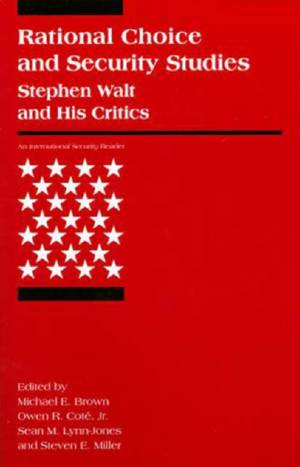
- Retrait gratuit dans votre magasin Club
- 7.000.000 titres dans notre catalogue
- Payer en toute sécurité
- Toujours un magasin près de chez vous
- Retrait gratuit dans votre magasin Club
- 7.000.000 titres dans notre catalogue
- Payer en toute sécurité
- Toujours un magasin près de chez vous
Rational Choice and Security Studies
Stephen Walt and His Critics
Description
Opposing views on the merits of formal rational choice approaches as they have been applied to international security studies.
Formal theories and rational choice methods have become increasingly prominent in most social sciences in the past few decades. Proponents of formal theoretical approaches argue that these methods are more scientific and sophisticated than other approaches, and that formal methods have already generated significant theoretical progress. As more and more social scientists adopt formal theoretical approaches, critics have argued that these methods are flawed and that they should not become dominant in most social-science disciplines. Rational Choice and Security Studies presents opposing views on the merits of formal rational choice approaches as they have been applied in the subfield of international security studies. This volume includes Stephen Walt's article Rigor or Rigor Mortis? Rational Choice and Security Studies, critical replies from prominent political scientists, and Walt's rejoinder to his critics. Walt argues that formal approaches have not led to creative new theoretical explanations, that they lack empirical support, and that they have contributed little to the analysis of important contemporary security problems. In their replies, proponents of rational choice approaches emphasize that formal methods are essential for achieving theoretical consistency and precision.
Spécifications
Parties prenantes
- Editeur:
Contenu
- Nombre de pages :
- 144
- Langue:
- Anglais
- Collection :
Caractéristiques
- EAN:
- 9780262522755
- Date de parution :
- 18-07-00
- Format:
- Livre broché
- Format numérique:
- Trade paperback (VS)
- Dimensions :
- 152 mm x 226 mm
- Poids :
- 254 g






